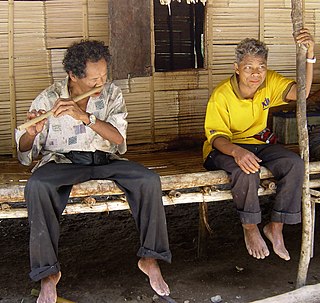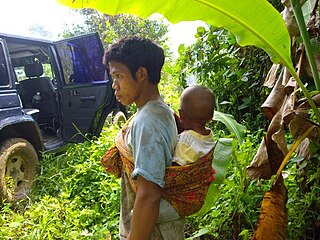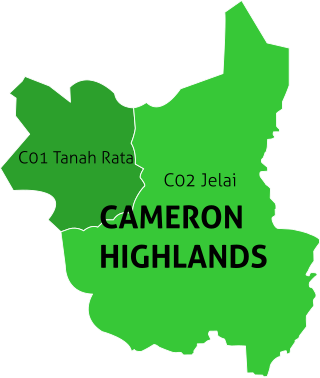Bumiputera or bumiputra is a term used in Malaysia to describe Malays, the Orang Asli of Peninsular Malaysia, and various indigenous peoples of East Malaysia. The term is sometimes controversial, and has similar usage in the Malay world, used similarly in Indonesia and Brunei.

Orang Asli are a heterogeneous indigenous population forming a national minority in Malaysia. They are the oldest inhabitants of Peninsular Malaysia.

Jakunpeople or Orang Ulu/Orang Hulu are an ethnic group recognised as Orang Asli of the Malay Peninsula in Malaysia.
Article 153 of the Constitution of Malaysia grants the Yang di-Pertuan Agong responsibility for "safeguard[ing] the special position of the 'Malays' and natives of any of the States of Sabah and Sarawak and the legitimate interests of other communities" and goes on to specify ways to do this, such as establishing quotas for entry into the civil service, public scholarships and public education.

The Semai are a semi-sedentary ethnic group living in the center of the Malay Peninsula in Southeast Asia, known especially for their nonviolence. This characterization was made by Robert Knox Dentan, an anthropologist who studied the Semai in the 1960s, though he offered a more nuanced view after subsequent fieldwork. They speak Semai, an Austroasiatic language closely related to Temiar, spoken by Temiars nearby. The Semai are bordered by the Temiars to the north and the Jah Hut to the South. The Semai belong to the Senoi group, and are one of the largest indigenous ethnic group in the Peninsula and the largest of the Senoi group. Most Semai subsist by cultivating grain crops, hunting, and fishing.

The Batek people are an indigenous Orang Asli people ; belonging to the Semang group, who live in the rainforest of peninsular Malaysia. As a result of encroachment, they now primarily inhabit the Taman Negara National Park. The Batek are nomadic hunters and gatherers, so the exact location of their settlements change within the general confines of the area that they inhabit.

The Second Malaysia Plan was an economic development plan introduced by the government of Malaysia with the goal of implementing the Malaysian New Economic Policy (NEP). It lasted from 1971 to 1975 and aimed to "restructure" the society of Malaysia and reduce Malaysian Chinese and foreign dominance in the economy of Malaysia so as to improve the economic position of the Malays. It was the successor to the First Malaysia Plan, which was also intended to specifically tackle the problem of poverty among the Malays. However, the First Malaysia Plan had limited success, which may have been a factor in the 13 May Incident in 1969 when race riots broke out in Kuala Lumpur. The Second Malaysia Plan had been regarded as excessive in its zeal to increase Malay participation in the economy, and the government accordingly scaled back the emphasis on restructuring the economy when the plan ended.

The Senoi Praaq is a unit of the Royal Malaysia Police made up almost entirely of the tribal people of Peninsular Malaysia known as the Orang Asli (aborigines). The name Senoi Praaq means war people or those who fight in the Semai language. Roy Davis Linville Jumper considered them one of the finest jungle fighting forces and was highly successful in diminishing the threat by communist forces during the Malayan Emergency.
The Duano' people, also called Desin Dolak or Desin Duano' are an indigenous people of Malaysia and Indonesia and can be found in islands along the northeastern region of Sumatra, Indonesia where most Duano' people have traditionally lived. They are one of the Proto-Malay group of cultures. Due to their nomadic boat lifestyle, based almost exclusively on fishing and collecting shellfish and crustaceans by using mud-boards, Duano' people are often categorized as Orang Laut, a group that includes the Urak Lawoi’ people and Moken people of the northern region of the Malacca Strait and the Andaman Sea. Although there are similarities in their way of life, they are a separate ethnic group. Citing their own language, culture, identity, and economic complexities, they deny being Orang Laut.

The Temuan people are a Proto-Malay ethnic group indigenous to western parts of Peninsular Malaysia. They can be found in the states of Selangor, Pahang, Johor, Negeri Sembilan and Malacca. The Temuans are classified as part of Orang Asli group according to the Malaysian government. They are also one of the largest and the most widespread of the Orang Asli ethnic groups.

The Senoi are a group of Malaysian peoples classified among the Orang Asli, the indigenous peoples of Peninsular Malaysia. They are the most numerous of the Orang Asli and widely distributed across the peninsula. The Senois speak various branches of Aslian languages, which in turn form a branch of Austroasiatic languages. Many of them are also bilingual in the national language, the Malaysian language.

The Orang Asal are the indigenous peoples of Malaysia. The term is Malay for "Original People", used to refer to the aboriginals of Sabah, Sarawak, and Peninsular Malaysia. These groups are given the Bumiputera status in Malaysia.

The Temiar are a Senoic group indigenous to the Malay peninsula and one of the largest of the eighteen Orang Asli groups of Malaysia. They reside mainly within Perak, Pahang and Kelantan states. The total ethnic population is estimated at around 40,000 to 120,000, most of which live on the fringes of the rainforest, while a small number have been urbanised.
Orang Kanaq are one of the 18 Orang Asli ethnic groups in Malaysia. They are classified under the Proto-Malay people group, which forms the three major people group of the Orang Asli. The Orang Kanaq are considered as the smallest Orang Asli group with the population of approximately 90 people only.
The Sagong Tasi case was a landmark land rights case in Malaysia, in which the courts ruled against the Selangor State in favour of the Temuan-Orang Asli plaintiffs.

Orang Seletar are one of the 18 Orang Asli ethnic groups in Malaysia. They are classified under the Proto-Malay people group, which forms the three major people group of the Orang Asli. The Orang Seletar are also considered as part of the Orang Laut, natives of the Straits of Johor; separating Singapore from Peninsula Malaysia.

Cheq Wong people are an indigenous Orang Asli people of the Senoi branch in Peninsular Malaysia. Although they have the physical appearance of the Senoi sub-group, the Cheq Wong language that they speak is closely related to the Northern Aslian languages.

A by-election was held on 26 January 2019 for the Dewan Rakyat seat of Cameron Highlands. The seat became vacant after the Election Court on 30 November 2018 declared the incumbent Barisan Nasional (BN) Member of Parliament of Malaysian Indian Congress (MIC) Dato' Sivarraajh Chandran's victory in the seat null and void because it was found that corrupt practices were committed in the 14th general election. The court found Sivarraajh guilty of bribing of between RM30 and RM1,000 to the Orang Asli community voters prior to the election as established beyond reasonable doubt in the election petition filed by the Democratic Action Party (DAP) candidate M. Manogaran.
Dato' Ramli bin Dato' Mohd Nor is a Malaysian politician and former police officer who has served as the Deputy Speaker of the Dewan Rakyat I under Speaker Johari Abdul since December 2022 and the Member of Parliament (MP) for Cameron Highlands since January 2019 and Non-Executive Chairman of Amanah Raya Berhad (ARB) since May 2020. He is a member of United Malays National Organisation (UMNO), a component party of the ruling Barisan Nasional (BN) coalition.
Ajis bin Sitin is a Malaysian civil servant who has served as the Director-General of Department of Orang Asli Development from 2017 to 2019. He was appointed as a Senator on 25 August 2021 to represent Pahang.













